LSE Library curator Gillian Murphy explores the life of Zuhra Karim (1932-2019), and LSE alumna and one of the great pioneers of women’s journalism in Pakistan. The Women’s Library at LSE holds a short run of her fortnightly women’s magazine SHE.
Zuhra Karim was born Sheila Zuhra Maureen Ahmad on 9 January 1932 in Bristol. Her father was Ghulam Aziz Ahmad who studied for an Electrical Engineering degree at Bristol University, graduating in 1930. While there, he was secretary of the University International Society and was also part of the University athletics team. In June 1931, he married Josephine Clinton, who lived in Bristol, and in the following January, Sheila was born. On 22 September 1933, Josephine and Sheila set sail for Bombay (modern Mumbai) in India aboard the ship “Mooltan”.
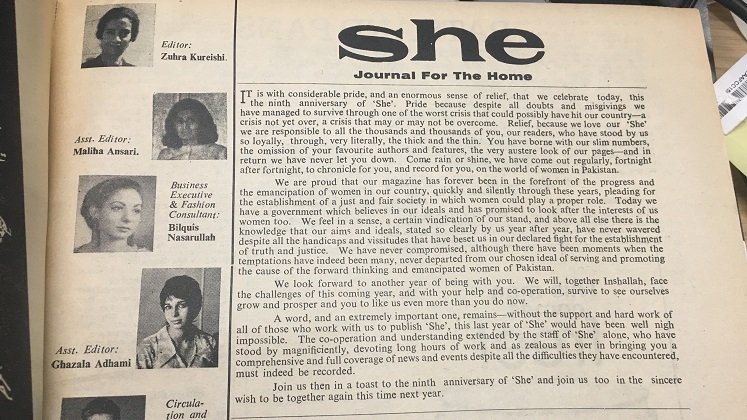
Passenger lists record Sheila travelling back and forth to England with her mother until 1938, when Sheila started Waverly Convent boarding school in Mussoorie in the north Indian state of Uttarakhand. In 1946, she set sail for England arriving in Liverpool on 7 October on board “Franconia” with her mother, sister Esme, who was 12, and brothers, Rishad, three, and Zafar, 18 months old. Josephine is noted as a housewife and their proposed address was India Supply Commission in Mount Street, London. Sheila then attended Assumption Convent, a boarding school in Sidmouth Devon, for two years.
From the electoral registers for this period, Sheila’s family lived at 48 Wynnstay Gardens in Kensington, and then moved to 17 Woodthorpe Road in Putney in 1949, perhaps because Sheila was now in London studying at Queen’s College in Harley Street for her Higher School Certificate Exams, which she passed in July 1950. Sheila wanted to read for an Economics degree at LSE that autumn but had missed the deadline for applications. Her father wrote to Professor Alfred Pippard, his old teacher from Bristol, to put in a word for him on behalf of his daughter. Pippard obliged and wrote to Sir Alexander Carr-Saunders, Director of LSE, asking if it was possible to put in a late application. Pippard added that his pupil was now a Trade Commissioner for the Pakistan Government in London, based at the High Commission for Pakistan in Lowndes Square in Kensington. Pippard concluded that Aziz was “an extremely able and attractive person, and if his daughter is anything like him, I am sure she would be a most desirable student”.
Zuhra Karim at LSE
On 29 August 1950 Sheila was interviewed by Dr Edmund C Rhodes (a statistician who became a reader at LSE in 1924, retiring in 1958), which was successful, and she started at LSE in October. In her first year, she studied international relations, structure of international society and international law. Her tutor was Mr Goodwin who reported that she was an able, young student but that she had been ill and was preoccupied with home responsibilities (probably looking after her siblings) as her parents were abroad for some months. Into her second year, Mr Goodwin was Sheila’s tutor again and he now reported that her strength was to be found in union work.
Sheila attended her first Students’ Union meeting on 5 December 1951 where it was noted that she would be taking tea with Boris Polevoi, a Russian author, in the Students’ Dining Room that evening [LSE Archives COLL MISC 0649/4/1]. In the next meeting five days later, Sheila suggested that research students should be brought into union activities which she would explore further. On 14 February 1952, Sheila showed a Chinese student delegation around LSE. Sheila became Deputy President of the Students’ Union but her studies suffered as a consequence of student union activities as she was referred in Statistics and changed her special subject. In 1953, Sheila passed her degree with Second Class Honours (Lower Division).
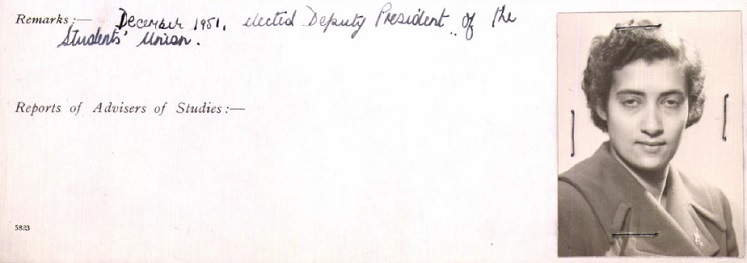
We next hear about Sheila in October 1957 when she met Sir Sydney Caine, who was now Director of LSE, to talk about returning to Pakistan. A typed note from Sydney to Vera Anstey stated that Sheila was working as an assistant to Jacques Kahane at the Food And Agriculture Organisation in Rome but that she wanted to leave to go back to Pakistan and get some kind of job in economic administration. Sheila’s information was that openings were not very promising, or at least salaries were not very attractive, and she came to ask if Sydney had any suggestions in connection, either with the Pakistan Government planning organisations, or activities of any of the international agencies in that country.
Unable to think of any openings immediately, Sydney suggested that Sheila should talk to Vera who might be able to help. Vera was an economist, retired but still worked part-time at LSE, both teaching and publishing on Indian and Pakistani economic development [LSE School Calendar 1957-1958]. Sydney added that there “remains in that country a good deal of prejudice against the employment of women in senior posts”. However, Sheila never talked to Vera as she became ill with influenza and, once better, decided to travel to Pakistan anyway to obtain some sort of job either with the Planning Board, or whatever was available, until she found something better. She was now signing her letters S Zuhra Ahmad.
Zuhra Karim in Pakistan
In Pakistan, Sheila was known as Zuhra. She married Omar Kureishi, who was the news editor of The Pakistan Standard and a cricket commentator. They had one son, Javed, born in 1961. Two years later, Zuhra launched the fortnightly women’s magazine SHE. Journal for the Home in Karachi. The Women’s Library at LSE holds a short run of issues of SHE from 1970 and 1973.
In the ninth anniversary edition of SHE, Zuhra was proud and relieved that they were able to celebrate this issue when things had looked very uncertain as Pakistan went through a major political crisis. Zuhra thanked her loyal readers for their support when the pages of the magazine looked austere and copy was thin. Zuhra was proud that the magazine was “at the forefront of progress and the emancipation of women in this country, quickly and silently through these years, pleading for the establishment of a just and fair society in which women could play a proper role” and “never departed from the chosen ideal of serving and promoting the cause of forward thinking and emancipated women of Pakistan.”
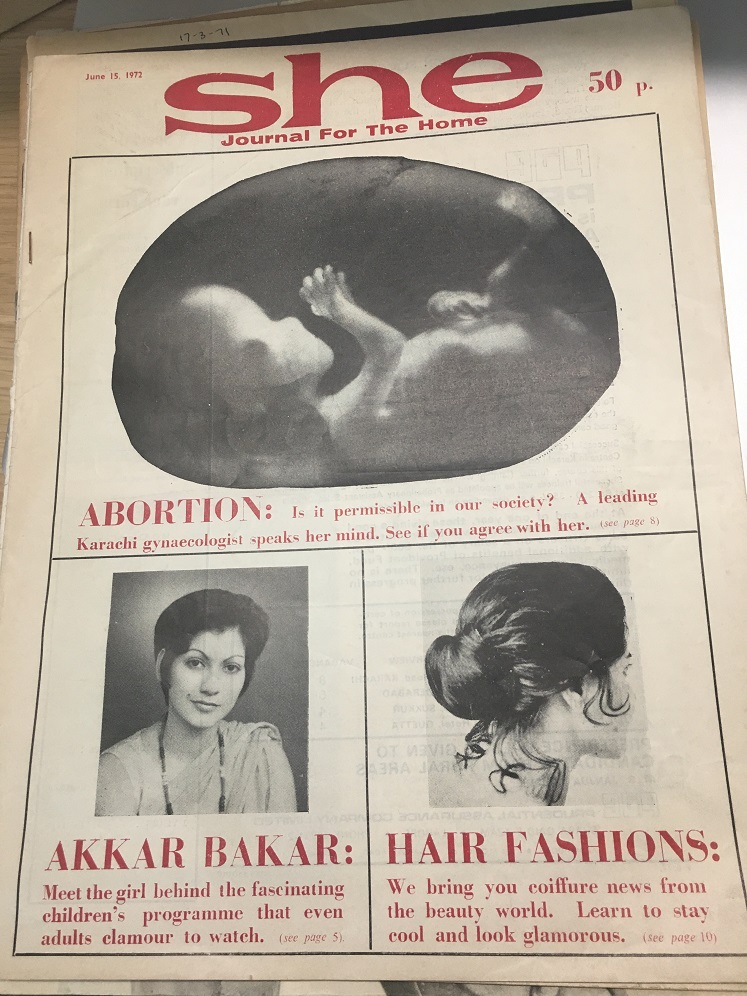
SHE magazine contained a mix of progressive special features and regular features more familiar with women’s magazines, such as a cookery section, book reviews, horoscopes and fashion (indeed, Zuhra’s sister-in-law, Bilquis Nasrullah, was fashion editor). From the issues that we hold, Zuhra ran stories on abortion, working mothers, women in business, widowhood, and a series called “Women of the world”.
Zuhra decided to stop production of the magazine in 1973 due to increased costs of printing and of paper. When the magazine returned in the early 1980s, Zuhra had divorced and remarried Masood Karim, a businessman, and they had one daughter, Ayesha. Bilquis Nasrullah also returned as fashion editor. Zuhra ran SHE until 2011 when poor health forced her to step down.
Find out about
- LSE Library and its South Asia collections
- The Women’s Library – Women’s Print Media
- Information on Zuhra Karim’s early years: Ancestry, FindMyPast, Bristol University Calendar 1928, 1930, 1932, Western Daily Press 21 May 1928 and 15 March 1929.


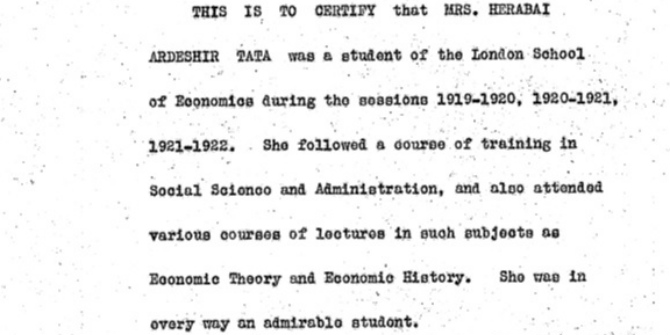
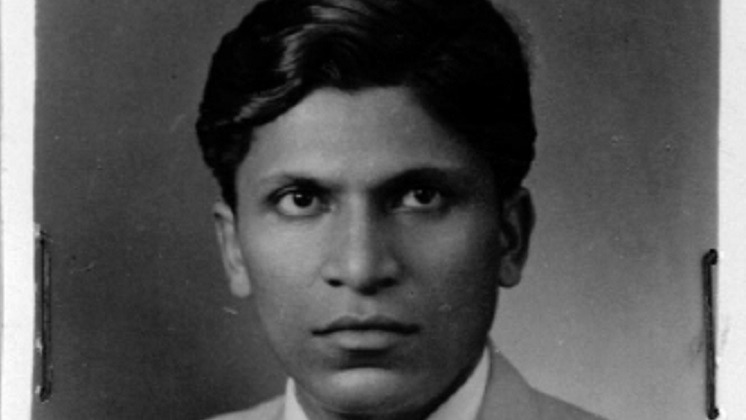

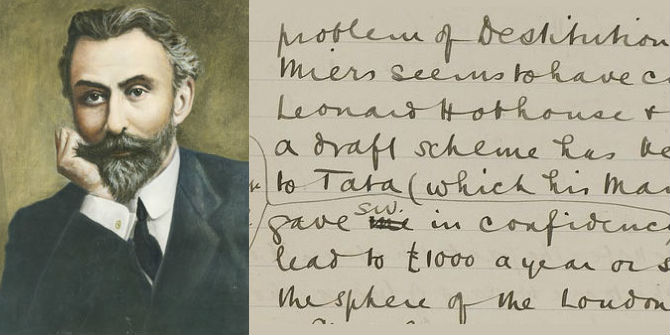
I am so proud to have worked with Mrs Karim as her fashion editor of SHE and Best of SHE after having lived in Paris for a long time.
She gave us girls total freedom to write on any subject relating to Women.